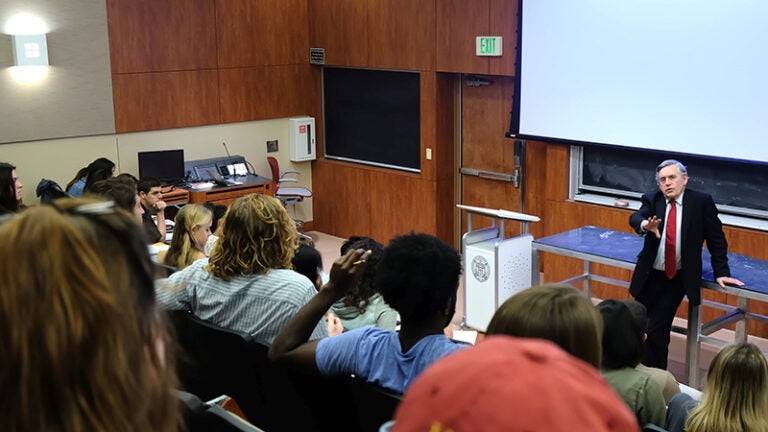
Undergraduates benefit from former British prime minister’s insights on globalization
It is rare for undergraduates to get a chance to take a course with a former world leader, but that opportunity presented itself recently at USC, where 87 students from across the university benefited from the wisdom and experience of Gordon Brown, former prime minister and chancellor of the exchequer of the United Kingdom.
Brown, who first taught at the university in 2015, returned to USC Dornsife this Spring to lead the course “Globalization with Gordon Brown,” delivering eight lectures from March 22 to April 10.
Brown said his desire to return to USC stemmed from his appreciation for the high quality of the faculty and the university’s desire to work with other universities in developing courses and sponsoring research and cross-cultural understanding.
He told students that due to globalization, our world view has shifted significantly.
“We used to think of countries as separate, sometimes isolated, out for themselves,” he said. “We now know that there are global problems that require global answers.”
His course examined the way countries come together to address these problems (for example, climate change) while also looking at international institutions, many created in the 1940s or ’50s, and whether they are up to date and still fit for purpose, he explained.
Issues students explored during the course included the challenges in creating a globalization that works best for everyone; identifying the main winners and losers from globalization; the impact of China and Asia’s rise; the roles of the United States and Europe; global climate change; the future of global cooperation; and the United Nations and its role in ending world poverty, illiteracy and disease.
“This was a tremendous opportunity to take a course with someone who led one of the most powerful and influential countries in the world and who is still considered one of the leading voices in working to reform many of our outdated global institutions and address global challenges,” said Steven Lamy, professor of international relations and director of the Task Force on Global and Political Studies.
Concern for humanitarian issues
However, this course was not limited to Brown’s experience as British prime minister, Lamy noted. It was also about sharing his insights on contemporary international relations and encouraging students to develop a concern for humanitarian issues and make a commitment to repairing the world. Brown had already inspired many of USC’s best and brightest students to change gears to pursue a career in public service, Lamy said.
Vision, hope and empathy
The former British prime minister spoke warmly of the USC Dornsife students enrolled in the course, saying they had “tested him” by asking insightful and even provocative questions. He was also impressed, he said, not just with their ability to work on projects but to present them effectively to their fellow students. Those presentations, he added, demonstrated the interest USC students have in changing the world for the better once they graduate.
“We want to see how we can create greater peace and security. All these issues require a greater degree of international cooperation.” Brown said. “The sadness is that, not just in one country or in one continent but in many continents, the world has adopted more protectionist, more nationalistic, and in some cases more isolationist, positions.” To solve these problems, he argued, requires international cooperation that will also require us to reexamine our international institutions and how they can work better.
Students’ interest in working for NGOs, civil society organizations and companies that pursue policies of social and environmental responsibility was a testament to this, he said.
“There are different ways that students are going to change the world, but what I am certain is that the students who leave this university will be students who do change the world.”
Brown ended the course by sharing what he views as necessary characteristics for all great leaders — vision, hope and empathy.
Jamie Kwong, a senior majoring in international relations with a master’s in public diplomacy, said Brown had provided thoughtful insight on the challenges globalization presents to international institutions.
“Being able to think through these pressing issues with a leader who has been in the room for these high-level conversations was a once in a lifetime experience,” said Kwong, who joins King’s College London next year on a Marshall Scholarship to pursue a Ph.D. in war studies.
Channing Thompson, a senior majoring in international relations, agreed, saying that learning from Brown was one of the most unique and valuable experiences she has had at USC.
“Dr. Brown was incredibly charismatic, friendly and engaging, and the opportunity to learn from someone with his experience was immeasurable,” she said. “Throughout the course, he shared with us the qualities he believes are crucial for transformative leadership, qualities I hope to emulate as I graduate and pursue my future endeavors.”